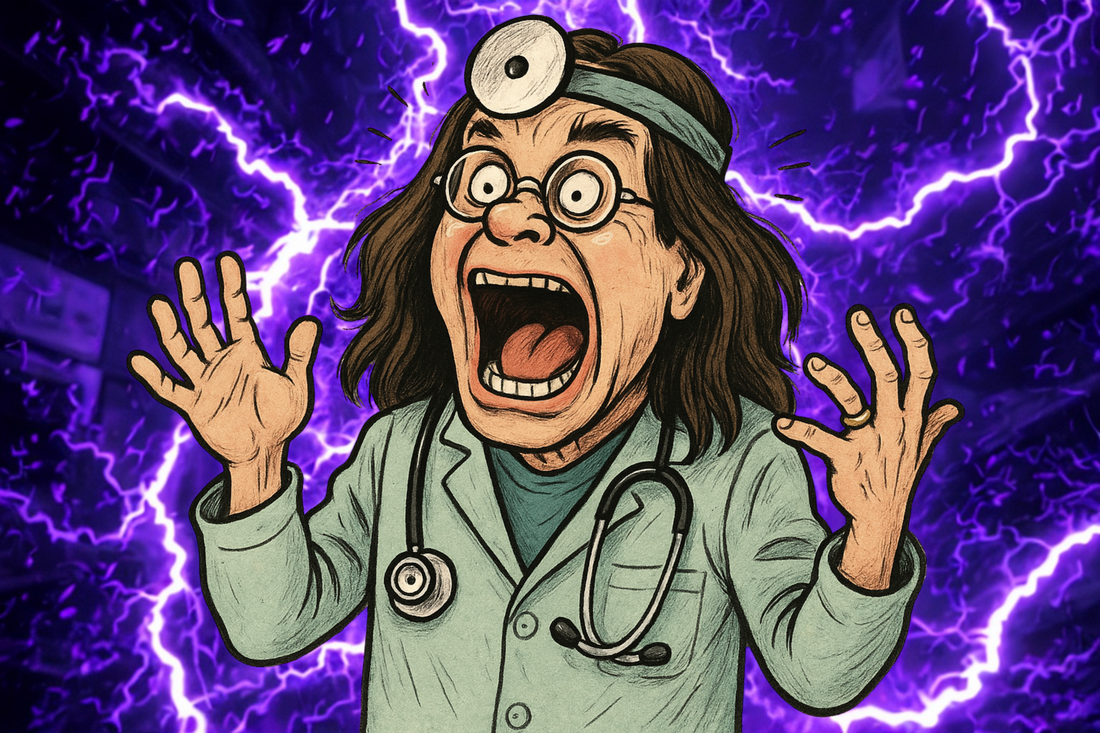
“Ask Dr. Ozzy”: When Rock’s Prince of Darkness Became a Doctor
Share
“Ask Dr. Ozzy”: When Rock’s Prince of Darkness Became a Doctor
In the realm of advice columns, few can claim the audacity of Rolling Stone’s “Ask Dr. Ozzy.” Debuting in October 2010 (you can read the first issue yourself here https://archive.org/details/rolling-stone-1116-2010-10-28-keith-richards/page/21/mode/2up), this recurring feature cast none other than Ozzy Osbourne — the legendary Prince of Darkness — as an advice-giving figure, responding to readers’ questions on health, relationships, addiction, and life’s absurdities.

At first glance, the pairing might seem incongruous. Ozzy, infamous for biting the head off a bat on stage, surviving decades of substance abuse, and navigating some of rock ’n’ roll’s wildest eras, hardly fits the archetype of a “doctor.” Yet that incongruity was precisely the column’s appeal: a space where survival, humor, and hard-earned wisdom collided.
The Origins: From Memoir to Magazine Column
The column emerged shortly after the release of Ozzy’s memoir, Trust Me, I’m Dr. Ozzy (2011), co-written with journalist Chris Ayres. The book blended autobiography, colorful anecdotes, and tongue-in-cheek guidance — a format naturally suited to a magazine column.
Readers could write in with questions on virtually any topic: how to cope with hangovers, manage stress, navigate relationships, explore spirituality, or simply survive life’s daily chaos. Ozzy’s responses were never conventional. He mixed sardonic humor with blunt life lessons.
For instance, when a reader worried about hair loss and possible surgery, Ozzy suggested embracing a shaved head and joked about the futility of trying to disguise it, reflecting humorously on the unpredictability of past hair transplants.
In another letter, a smoker asked for help quitting. Ozzy candidly shared his own extreme experiences with nicotine, emphasizing that quitting ultimately requires personal commitment — a mix of humor, absurdity, and hard-earned truth.
Why “Ask Dr. Ozzy” Resonated
Several factors explain the column’s unique appeal:
-
The Rock ’n’ Roll Perspective – Ozzy had lived through decades of extremes. From Black Sabbath’s rise in the 1970s to solo career triumphs, health scares, and personal tragedies, he spoke from experience. His answers carried the weight of someone who had survived the chaos readers feared.
-
Humor as a Tool for Wisdom – The column wasn’t about formal medical advice; it was about perspective. Ozzy could take serious concerns — addiction, aging, hair loss, or existential questions — and approach them with humor and candid honesty.
-
Breaking the Advice Column Mold – Traditional columns rely on authority. Ozzy’s charm came from the opposite: a survivor, not a professional, offering guidance through lived experience.
“Life throws everything at you. The trick is to survive it — preferably with a laugh.”
Recurring Themes in the Column
While questions varied, several themes emerged consistently:
-
Health and Survival: Readers asked about hangovers, hair loss, or coping with physical exhaustion. Ozzy’s answers blended humor and insight, encouraging acceptance and focusing on what could be controlled.
-
Addiction and Personal Habits: In letters about quitting smoking, Ozzy shared his own struggles and absurd stories, yet emphasized personal responsibility: change only comes when the individual truly decides.
-
Relationships and Lifestyle Choices: Romantic, familial, or everyday dilemmas were tackled with irreverence and empathy. For example, readers asked about foot care and hygiene — seemingly trivial topics — and Ozzy responded with a blend of humor and encouragement, normalizing self-care while keeping the tone entertaining.
-
Spirituality and Self-Discovery: Ozzy could address even philosophical or religious questions. When a reader expressed curiosity about Buddhism while navigating a multi-faith family background, Ozzy encouraged following what resonates personally, modeling tolerance and open-mindedness.
-
Self-Acceptance and Living Boldly: Perhaps the most enduring message: embrace imperfection. Life is messy and unpredictable, and survival — often with humor — is an achievement in itself.
Notable Moments and Anecdotes

Several letters highlight Ozzy’s unique voice:
-
Hair Loss: A thirty-something reader fretted about thinning hair. Ozzy advised shaving the head, avoiding hats as a disguise, and humorously reflected on the luck of those who retained their hair.
-
Smoking Addiction: A reader worried about quitting smoking after decades. Ozzy recounted his own extreme nicotine habits and reminded the reader that quitting only happens when one truly wants it.
-
Spiritual Exploration: A reader raised atheist but curious about Buddhism asked for guidance. Ozzy responded with humor and honesty, sharing his own eclectic background and emphasizing following what resonates with the heart.
-
Foot Care: One reader asked whether it was socially acceptable for men to get pedicures. Ozzy acknowledged the dilemma with humor, balancing cultural expectations with the practicality of self-care, showing that even mundane grooming could be addressed with levity and candour.
-
Belly Button Hygiene: Another reader wrote about unusual hygiene concerns. Ozzy turned the question into a comedic lesson about basic self-care and attention to small details, again demonstrating that no topic was too trivial for a candid, humorous, and relatable response.
These examples showcase Ozzy’s ability to make readers laugh, reflect, and accept themselves, even on topics most advice columns wouldn’t touch.
Cultural Significance
“Ask Dr. Ozzy” reflected a shift in media where celebrities became advisers, not just entertainers. Unlike other celebrity columns, Ozzy’s stood out because of his authenticity. He wasn’t performing a role; he was offering a window into a life few could imagine, with humor, humility, and occasional absurdity.
The column highlighted Rolling Stone’s innovation: combining celebrity culture, humor, and reader interaction to create content both entertaining and culturally resonant. Millennials, Gen X readers, and longtime fans could all relate to his mix of chaos, survival, and candid wisdom.
Legacy of “Ask Dr. Ozzy”
Though it ran primarily in the early 2010s, the column remains a fan favorite. Digital archives and DVD collections of Rolling Stone preserve its humor and insight. Beyond nostalgia, “Ask Dr. Ozzy” demonstrates how celebrity-driven content can combine entertainment, authenticity, and subtle life lessons.
Ozzy’s advice often delivered messages of tolerance, self-acceptance, and resilience, even when framed in irreverent humor. From personal struggles with smoking and hair loss to deeper questions about spirituality, hygiene, or lifestyle choices, he reminded readers that:
-
Life is messy, and imperfection is normal.
-
Change only comes when you take responsibility.
-
The right path is often the one that resonates with your heart, not what others dictate.
“Even the Prince of Darkness can give advice… though maybe not the kind you’d expect.”
Across letters, Ozzy consistently blended humor, humanity, and insight, leaving readers with a voice that was funny, honest, and profoundly human, able to address both trivial and profound concerns with equal grace.
References & Further Reading
-
Ozzy Osbourne with Chris Ayres, Trust Me, I’m Dr. Ozzy, 2011
-
Rolling Stone digital archives (early 2010s issues featuring “Ask Dr. Ozzy”)
-
Interviews and retrospectives: The Guardian, Louder Sound
-
Analysis of celebrity advice columns: The Atlantic, Vulture
